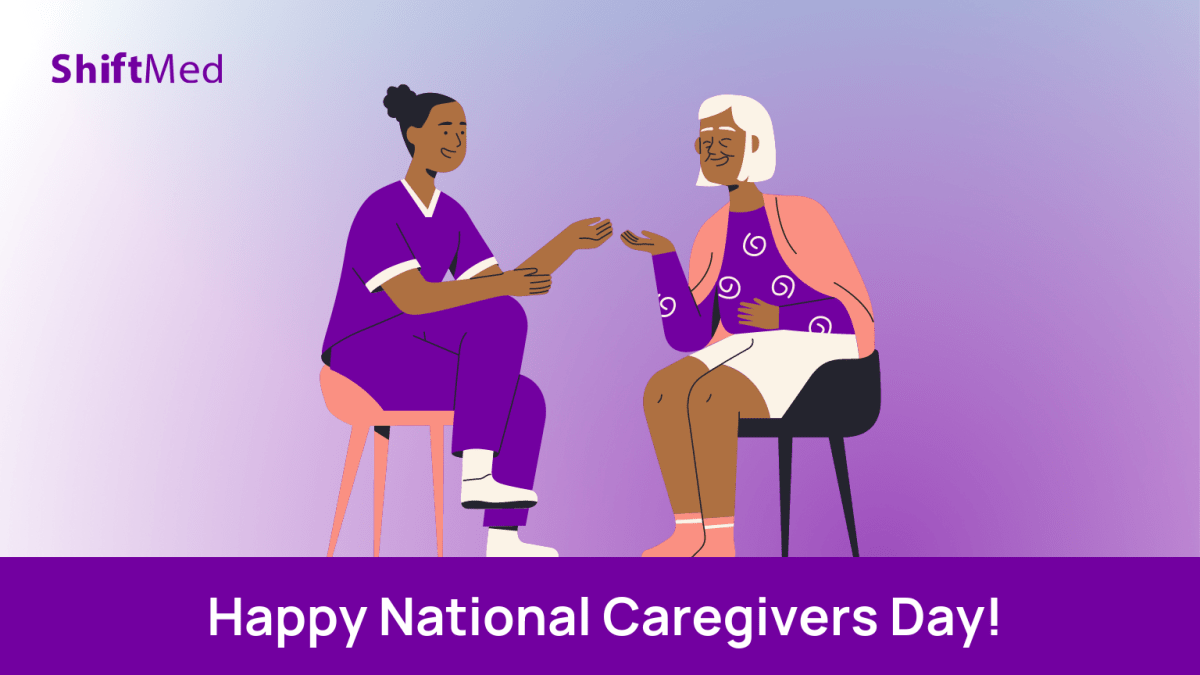
Whether you’re taking care of a family member at home or a patient in the hospital, the care and compassion you provide are nothing short of amazing. And it’s why we want to celebrate everyone in healthcare on National Caregivers Day. But there’s more to this observed holiday than meets the eye.
While most in-home caregivers and nurses are great at caring for others, they fail to take care of themselves. If this sounds familiar, National Caregivers Day is also a great time for you to reflect on your self-care and make lifestyle changes that will help you stay strong all year long.
“Caregiving often calls us to lean into love we didn’t know possible.”
―Tia Walker, author of The Inspired Caregiver
To remain effective in your caregiver role and personal life, you must be physically, mentally, and emotionally healthy. Sounds obvious enough, right? Unfortunately, most caregivers forget about their own needs. Some even get so used to being stressed they don’t realize the toll it’s taking on them until it’s too late.
Caregiver Burnout Symptoms
If you’re experiencing any of the below symptoms regularly, you know it’s time to make yourself a priority. After all, when you feel good, it’s easier to put the needs of others in front of your own.
You become easily frustrated with minor obstacles.
You are quick to lose your temper with family and friends.
You cry more often and feel more emotional than usual.
You have trouble falling asleep or staying asleep.
You have suddenly gained or lost weight.
You have frequent, intense headaches or chronic backaches.
“Difficult and meaningful will always bring more satisfaction than easy and meaningless.”
—Maxime Lagace, professional ice hockey player
5 Ways to Prevent Caregiver Burnout
To prevent yourself from feeling overwhelmed, overtired, and irritated, here are five strategies to preserve your health and well-being while caring for others.
1. Ask for and accept help.
Taking care of a family member can feel all-encompassing—but it doesn’t have to be. If you’re feeling overwhelmed, ask a friend or another family member for help. There’s no shame in that. If someone volunteers to help, take them up on their offer—and don’t feel guilty about it.
2. Plan and keep a consistent routine.
Identify ways to prioritize and manage your time wisely. Make to-do lists and create a weekly schedule using the time blocking method. It’s a time management technique where you divide your day into blocks of time, and each block is assigned a specific task. When creating your schedule, be sure to set time aside for self-care and connecting with friends and family.
3. Set realistic goals and establish boundaries.
When setting goals, look for ways to set yourself up for success. For instance, break down large tasks into smaller steps. You also need to learn how to say ˈnoˈ. For example, it’s ok to say no when asked to volunteer at your child’s school. It can be tough to do, so keep reminding yourself that you can’t be everything to everyone.
4. Develop and maintain a healthy lifestyle.
As you develop a consistent routine, be sure to carve out time in your schedule to meal plan and incorporate exercise into your days. After all, it’s easier to maintain a healthy lifestyle when you plan. You could also schedule time each week to walk or go to an exercise class with a neighbor. By doing so, you make yourself accountable and are more apt to follow through.
5. Find relatable resources and join a support group.
Caregiver resources are available at your fingertips, so be sure and check out the National Alliance for Caregiving and the Family Caregiver Alliance. Also, look for support groups in your community. People in support groups are great at providing validation, encouragement, and strategies because they can relate to everything you’re going through.
“You cannot keep giving to others if you do not give to yourself, first. It is like pouring water from a vessel: you cannot pour and pour without ever refilling it—eventually, it will run dry.”
—Leslie K. Lobell, licensed professional counselor
While National Caregivers Day occurs every third Friday in February, caregivers of all kinds are worthy of being celebrated year-round. Thank you for all your hard work and continued compassion—and remember to take care!